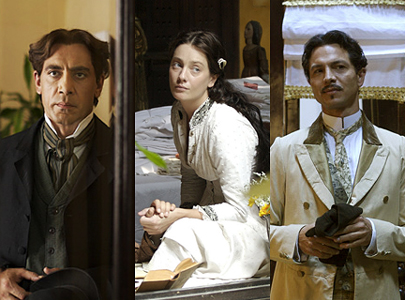
From the moment that Mike Newell (the director of such classics as Four Weddings and a Funeral and Mona Lisa Smile) decided that he would be the one to adapt Columbian author Gael Garcia Marquez’s classic, Love in the Time of Cholera, this film was doomed. Where Marquez’s story of a fifty-year love triangle between Florentino Ariza, Fermina Daza and Juvenal Urbino is epic, romantic and magical, Newell’s film version is tedious, clichéd and cheap. The setting and costume design feel self-consciously exotic (palm trees everywhere!), the central relationship is reduced to a series of superficial “will they/won’t they” moments (though we don’t really care either way) and the characters are all ridiculous caricatures (in particular, watch out for John Leguizamo’s awful turn as Fermina’s whip-cracking father). Newell’s effort can be most succinctly summarised by his choice of Shakira for the soundtrack; he just does not get it.
Perhaps the novel was just not appropriate for adaptation. It’s true that on paper, the story comes alive through Marquez’s rich writing and the intricate detail with which he recounts each of Florentino’s pursuits. Without this lyrical beauty, the story is reduced to an exercise in time biding, in anticipation of that inevitable point of gratification. Still, this is where Newell could have used the tools of cinema to craft something more appropriate (and less tacky). Instead, he’s also chosen to ignore one of the most intriguing aspects of Marquez’s writing; his magical realism. And Lord knows that any sort of break in the trudging narrative of this film would have been a welcome one. With flat characters, unconvincing relationships and a slow-moving plot to boot, this is a cinema experience to avoid at all costs.
1.0







